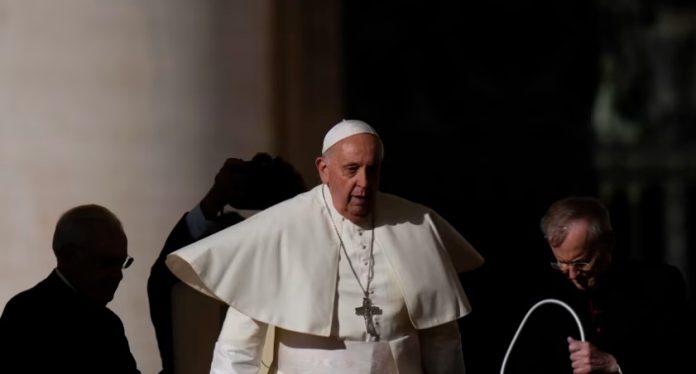The Vatican’s doctrinal office said Wednesday that transgender people could be godparents at baptisms in the Roman Catholic Church, witnesses at religious weddings and receive baptism themselves.
But the agency, known as the Dicastery of the Doctrine of Faith, has not given a clear answer to the question of whether a same-sex couple can perform the church baptism of an adopted child or a child received through a surrogate.
In July, Bishop Jose Negri of Santo Amaro, Brazil, sent six questions to the doctrinal office regarding LGBT people and their participation in the sacraments of baptism and marriage. Pope Francis approved the three pages of questions and answers on 31 October. They were published Wednesday on the department’s website using the Italian word for “transsexuals.”
Francis, 86, is trying to make the Church more welcoming to the LGBT community without changing Church teachings, including one that says same-sex attraction is not sinful, but same-sex acts are.
Asked whether transgender people can be baptised, the doctrinal office said they can, but with certain conditions and provided “there is no risk of causing public scandal or disorientation among the faithful”.
It said transgender people could be godparents at baptism at the discretion of the local priest, and witnesses at a church wedding, but that the local priest must exercise “pastoral discretion” in his decision. Father James Martin, a prominent Jesuit priest and supporter of LGBT rights in the Church, said on X:
This is an important step forward in the Church seeing transgender people not only as people (in a Church where some say they don’t really exist) but as Catholics.
Francis has met with transgender people and in July, he told a transgender person:
Even if we are sinners, he (God) draws near to help us. The Lord loves us as we are, this is God’s crazy love.
The document states that a person in a same-sex relationship can also be a witness at a Catholic wedding. The document refers to current Church canon law, which contains no prohibition against this. Less clear was the answer regarding same-sex relationships and their role in baptism, which is the initiation of infants, children or adults into the Church.
The Brazilian bishop asked for clarification on whether a same-sex couple who have adopted a child or received a child from a surrogate mother can baptise it according to the Catholic rite. The response said that for a child of a same-sex couple to be baptised there must be a “well-founded hope that the child will be brought up in the Catholic religion”.
An equally nuanced answer was given to the question of whether a person in a same-sex relationship can be a godparent in a church baptism. The answer states that such a person must “lead a life consistent with the faith.”
A small but growing number of US parishes have formed LGBTQ support groups and welcome transgender people on their own terms. Yet several Catholic dioceses have issued guidelines targeting trans people with restrictions and refusing to recognize their gender identity.
